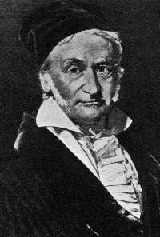MATHEMATICS
| Mathematics is a field so vast and interesting that no one can live
without it. I'll bring you along a journey of mathematical discovery and
intrigue you with the many wonders of Mathematics!
One of the most prominent maths prodigies is Carl Friedrich Gauss
(shown on the right). He along with Archimedes and Isaac Newton are
considered the 3 greatest mathematicians the world has ever seen. There
are other prominent mathematicians like Leonhard Euler, Pierre de Fermat,
and many others. We'll look at the achievements of these great people and
the Mathematics they brought to us. We'll also explore the vast fields of
mathematical theories and the many challenges lying ahead of us. Tease
yourself with the many puzzles under the "Recreational Mathematics"
section. The most important thing is to enjoy this expedition! |
 |
1. Great Mathematicians
List of
Great Mathematicians and their achievements.
Era of Greek Mathematics
Index of
Mathematicians
2. Mathematical Evolution
This section explores the evolution of
Mathematics. How are new fields of Mathematics discovered? How did Mathematics
start in the first place?
The
Beginning: how it all started
Number
Systems: how numbers evolved
We'll also take a look at the many stories throughout the history of
Mathematics, including rivalries, evolving ideas, etc.
The Story of Zero
The Story of
Number Theory
The Story of Polynomial
Equations
The Story of Complex
Numbers
The Story of Newtonian
Mechanics
The Story of N-body Problem
The Story of Chaos Theory
3. Fields of Mathematics
There are many fields of Mathematics,
ranging from Arithmetic to Calculus to Foundation of Mathematics. At the dawn
of Mathematics, there was only Arithmetic and Geometry. The
ancient Greeks were the ones who glorified Geometry, while the Pythagoreans
praised Arithmetic. Then things got more complicated and Algebra was
born. The landmark work being al-Khwarizmi's
treatise Hisab al-jabr w'al-muqabala on Algebra in 825, which eventually
gave us the word 'Algebra'. As different fields of Mathematics merged, new
fields evolved. Trigonometry was a mix of Algebra and Geometry, and the
word 'Trigonometry' was first used in 1595.
Descarte's La G�om�trie algebraized Geometry into Analytic
Geometry. The use of the word 'Analytic' is misleading as Analysis is a
field dealing with limits (the infinite and the infinitesimal) and which evolved
much later. The landmark of which was the first great textbook on Analysis Introductio in analysin infinitorum
published by Euler in 1748. In the 17th century, many
mathematical fields sprung up. Girard Desargues
founded Projective Geometry. Probability Theory arose from
Pascal and Fermat's exchange
of letters in 1654 on the Dice Problem and the Problem of Points. Calculus
blossomed from Newton's 2 years (1666-7) of stay at
home due to the plague. Leibniz shared the
honour of the co-founder of Calculus. In the 18th century, Euler founded
Topology with his solution to the Konigsberg Bridge problem. In the 19th
century, Mathematics evolved to a stage where the basic foundation that held it
so watertight, Logic, came under scrutiny. George
Boole investigated the Foundation of Mathematics in 1854 and
Georg Cantor created Set Theory in 1874.
Chaos Theory rose from Poincar�'s 1889 paper on the Three-body Problem.
In some cases, there is no clear cut date for the rise of the theory. E.g.
Number Theory has always been taken to be same as Arithmetic, but is now
reserved for the study of deeper Arithmetic, while Arithmetic is reserved for
elementary manipulations. I
would have missed out many other fields of Mathematics, like Complexity
Theory, Statistics, Group Theory, Graph Theory, etc.
Analysis
4. Recreational Mathematics
In the past, Mathematics is mainly
practiced by the professionals, now it has become another form of entertainment
to many amateurs. There are presently many magazines featuring Recreational
Mathematics of all forms and varieties. Among the most prominent is the
'Recreational Mathematics' column in Scientific American. There are also loads
of Maths books written in more easily understood language for the general public
to read. We will journey into Recreational Mathematics and the many joys they
bring to us. Some Recreational Mathematics are pure fun, while others are
serious applications of Mathematics. Whatever the purpose I am sure you will
enjoy it as much as I do. Try the Mathematical puzzles yourself. Once you have seen through the puzzles, challenge yourself to see how well you fare in the 'Mathematician Test'. For all you know, you could be the next greatest mathematician!
Puzzles involving shapes and figures
Word puzzles
Teasers
Logic puzzles
Probability puzzles
Cryptarithmetic
Number Theory puzzles
Geometry puzzles
Fallacy puzzles
Sequence puzzles
Algebraic puzzles
The Mathematician Test
5. Unsolved Problems
Although developments and breakthroughs
in Mathematics are constantly generated, there still exist a great many unsolved
mysteries in Mathematics. The most obnoxious of these was the famous 'Fermat's
Last Theorem', which met its fate in 1994, when Professor Andrew Wiles filled in
the last piece of the 350-year-old puzzle. Still there are others which have
withstood the efforts of even the greatest of all mathematicians. Have a look at
some of them and see if you could provide some insight to the problems.
Last of all, I would like to voice my opinion of the most important Mathematics in the 21st century. What are the challenges lying ahead
of us in the new century? Are there going to be unexpected discoveries like
G�del's Theorems?
21st
century Mathematics: what awaits us?
6. Maths Tutor
Teaching of Mathematics is no easy business. It is not
just about bringing across new concepts and theories to the students, or just
about practicing on problems in the books. This makes the lesson dry and boring.
To make it interesting, it is necessary to relate Mathematics to everyday life
and to stimulate mathematical thoughts. Puzzles help in this, but more important
tools are what I call Mathematical
Exercises.
This page has been visited  times.
times.
Any comments please email to TKH
